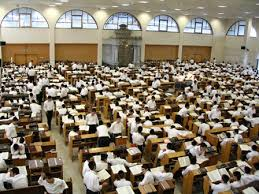 |
| Should 70% of these students serve in the IDF? |
Rabbi Shulman indicated that a lot of his peers agree with what
he says in his article. I am therefore happy to see that there may be a grass
roots movement in the Charedi world that counters the oft heard strident anti IDF pronouncements
by Charedi rabbinic leaders.
Even though he no longer sits in a Kollel – it can be seen from
his knowledge of the sources that he is quite knowledgeable. Someone who is
surely the cream of the Charedi crop when it comes to Torah knowledge. After explaining
the sincerity and Yiras Shmayim of both the Charedi and Dati Leumi world along
with the valid arguments often made by both of their own positions about
serving in the IDF, here is some of what he said:
(The) Mishna and Gemara in Bava Basra 7b-8a and (it) is explicitly stated in Shulchan Aruch (Choshen Mishpat 163): “Everyone in the city is obligated to contribute to communal needs, including its protection.” Yes, everyone. The concept of שוויון בנטל (sharing the burden) is not just a slogan—it’s a clear halachic requirement. There’s no need to appeal to morality or logic for those who don’t immediately accept them; this comes directly from God’s Torah, which has guided us throughout our history: everyone in the city must “share the burden.”
That being said, there is a special exemption for a select few, those categorized as רבנן, or—as the poskim refer to it—תורתם אומנותם—“those whose occupation is Torah study,” the reason being, their Torah protects them. This is also a well-established halacha (ibid. seifim 4-5, sourced in the Gemara and Rishonim). Anyone who dedicates their entire life—day and night—to studying God’s word, giving up worldly pursuits and making Torah their profession, is exempt from civic duties pertaining to protection. That much is clear.
What’s less clear is exactly who qualifies for this exemption. Not every yeshiva student necessarily meets these criteria. Firstly, it is unanimous that the exemption applies only to those who are truly sitting and learning diligently and are (at least, on their way to becoming) talmidei chachamim. It also involves meticulousness in observing halacha and having a deep sense of yiras Shamayim (see Beis Yosef ibid., which—in my opinion—is sourced in the Gemara, as elaborated in Toras Chaim 8a)…
From what I gather, most people in the Dati Leumi community would have little issue with everything mentioned so far. They wouldn’t object to exempting those who genuinely qualify, even if the percentage of those qualifying is higher than they might assume (I wouldn’t be surprised if it falls somewhere up to even 30%). The real concern lies with the majority who may not qualify—What justification do they have?
This of course means that based on his own personal experiences in the Torah world - which included learning in the BMG (Lakewood) Kollel, about 70% of Charedim in Israel should be subjected to the draft. Only about 30% should be exempted.
As noted, this flies ion the face of the clear
pronouncements by Charedi rabbinic leaders on both sides of the ocean that none
of them should serve.
Rabbi Shulman puts to rest the argument that Shmad (disabusing
religious soldiers of their religious observance) is their reason for such
strident opposition. While that may have been the case at the founding
of the state, that is by far no longer the reason for drafting Charedim. It’s
all about the need for manpower. That it exists at all - it does not exist in any significant measure. That seems to be a
broad based acknowledgement among his Charedi peers as well. Both here and in Israel.
All of which makes the strident, angry opposition by
rabbinic leaders open to serious challenge. Especially since they do not cite
any sources for their anti draft proniuncments. Which brings me to the response
by Rabbi Goldstein. Who uses his own formidable knowledge of Torah sources to
strike down any of the reservations mentioned by Rabbi Shulman.
I am not here to pick
a side. Or to determine whose position is a more valid Torah based one. But I question
the need for Rabbi Goldstein to push the envelope beyond what Rabbi Shulman has.
Instead of welcoming this newfound willingness to agree that most Charedim in
Israel should serve, Rabbi Goldstein tries to refute even the slightest reservations
Rabbi Shulman had. In attempting to do so, He undermines whatever progress
Rabbi Shulman might have made towards Charedim serving in the IDF.
I get that there is a war going on. But that is precisely
the reason he ought to welcome what Rabbi Shulman said instead of trying to refute
him.
That being said - as happy as I am with Rabbi Shulman’s honest
view of the Charedi obligation to serve in the IDF, I am sad that he had the
need to hide his identity and use a pseudonym. Not that I blame him. He does
not want to lose his standing among his peers or worse – become ostracized. He
also wants his children to get married someday. Which will be a lot harder
for them to do when their father is seen in opposition to Daas Torah. And I am
also disappointed at Rabbi Goldstein’s response. Even if he is 100% right, I think
he was wrong to undermine a valiant effort to change the paradigm of army service
in the Charedi world.
As things stand now, I don’t see this going anywhere. But still it’s nice to know that there actually are more than a few card carrying Charedi Talmidei Chachamim that understand the Torah in a way that if their views were implemented, it would completely change the polarization that exists between Charedim and the rest of Israeli society. In the direction of Achdus. But it’s a start. Maybe someday.